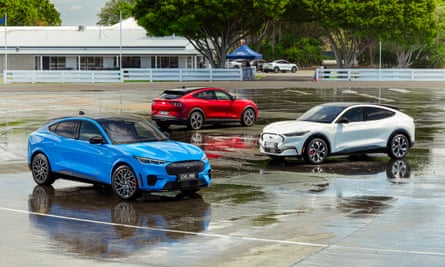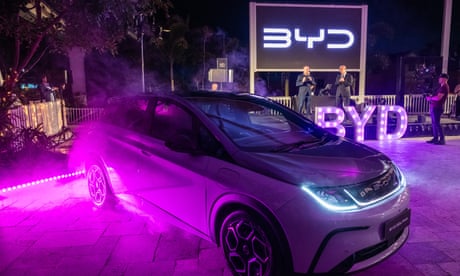Extract from The Guardian

Volkswagen’s Kombi-like electric ID Buzz people mover is one of a slew of EVs making their debuts in Australia in 2024.
A battery-powered Mustang and Volkswagen’s electric take on the Kombi van are some of the vehicles to arrive in 2024.
Sat 30 Dec 2023 10.27 AEDT
Last modified on Sat 30 Dec 2023 11.37 AEDTNear-silent sports cars, a battery-powered Mustang, Toyota’s first electric SUV and a modern take on the Kombi van are expected to launch in Australia in what is said to be a breakthrough year for electric vehicles.
The predictions come after some big-name manufacturers committed to bringing their electric models to Australia for the first time and follow the federal government’s commitment to change laws to encourage their sale.
Industry experts say carmakers will have to work hard to impress buyers, who are likely to be less loyal to the same brands when switching from a petrol to an electric car.
Major automakers expected to launch electric cars in Australia for the first time will include Jeep, Ford, Toyota and Volkswagen, in a trend expected to shake up the market.
The Electric Vehicle Council chief executive, Behyad Jafari, said giving motorists more options would be critical to increasing EVs’ take-up and could lead to sales jumping again over the next 12 months.
“We’re finding that as electric cars are made available to people, as they come in different shapes and sizes, Australians are excited to get behind the wheel and save money on ever-increasing petrol prices,” he said.
Australian drivers bought more than 80,000 electric cars between January and November, according to Federal Chamber of Automotive Industries figures, but Jafari said some buyers were holding out for specific vehicles that were still only available overseas.
“We’ll see a few options in electric and plug-in hybrid utes be made available in 2024 and it will be good to see the impact that can have on the market,” he said.
“The [electric] Kombi van has everyone pretty excited, so it will be good to get that back on our roads again.”

The Everything Electric chief executive, Dan Caesar, said having more options available in the Australian market could challenge the popularity of traditional vehicle brands, as customer loyalty “when buying EVs is very low”.
“In the past, people who bought BMWs or Mercedes often said they would buy another BMW or Mercedes,” he said.
“What we’re seeing now is that they may well choose a brand they haven’t historically preferred, they may go and do something different, and we’re seeing that in every market.”
Caesar said motorists were also increasingly choosing cars with fresh and recognisable designs to advertise their low-emission choice.
“The front edge of EV buyers seem to be interested in cars that are more conspicuously electric and look a little more interesting,” he said.
Here are some of the most notable EV launches headed our way:
Volkswagen ID Buzz: like a Kombi but quiet, this electric reimagining of Volkswagen’s famous people mover will feature seven seats and come in two-tone colours. It’s expected to command more than $100,000 and could arrive in December
Polestar 4: due in Australian showrooms in August 2024, this futuristic vehicle is a mid-sized SUV with a large interior, glass roof, 39cm display and, controversially, no rear window. Its price will start at $81,500
Ford Mustang Mach-E: while early deliveries of this vehicle arrived in December, many more are expected in early 2024. The electric addition to the Mustang brand features an SUV body, three model choices and a range of up to 600km. It is priced from $72,990
BYD Seal: the sportiest electric car in BYD’s lineup, the Seal promises to reach 100km/h in as little as 3.8 seconds and travel for up to 650km on a charge. Prices for its three models range from $49,888 to $68,748
Toyota bZ4X: the first electric car from Australia’s most popular brand is due to launch in February after a series of delays. The battery-powered SUV will come in single and dual-motor variants, with a 30.5cm touchscreen and 51cm wheels. Its price is expected to start at about $90,000
Kia EV5: the third electric vehicle based on Kia’s electric platform, after the EV6 and EV9, is expected to look like a Sportage when it arrives in 2024. The SUV could also come with a price below $50,000, based on the price it commands in China
MG Cyberster: MG will return to its roots in 2024 with the release of the Cyberster, the brand’s first sports car in 13 years and its first under Chinese owners. The convertible with scissor doors and three screens is expected to command a price higher than $100,000
Audi Q4 E-Tron: three years after its European unveiling, Audi’s mid-sized SUV is due to arrive in Australia halfway through the year. Audi’s third local electric vehicle will be priced from $88,300 and will be available in four configurations
Jeep Avenger: the smallest vehicle from Jeep has been confirmed as a starter for Australia and is expected to arrive in the second half of 2024. The electric SUV will feature a 25.4cm touchscreen and a 400km range, though its price has yet to be confirmed
Tesla Model 3: the updated version of Tesla’s entry-level car, dubbed Highland, will deliver design and technology updates when it arrives early in 2024. Updates to the $61,900 vehicle include a more aerodynamic exterior, additional soundproofing and an extra display for back-seat passengers.

No comments:
Post a Comment